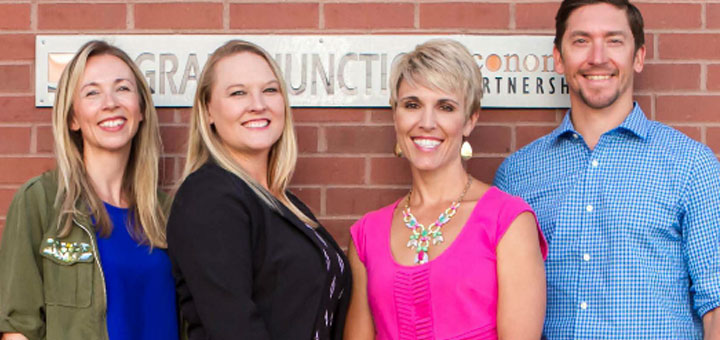The Grand Junction Economic Partnership (GJEP) is the official economic development agency for Colorado’s Grand Valley region, which includes Mesa County and the cities of Grand Junction, Fruita, Palisade, De Beque, and Colbran. GJEP is a private, non-profit organization that provides business services and operates in conjunction with its economic development partners in local government and the private sector. Its vision is to create quality jobs and expand capital investment through the attraction, expansion, and retention of primary business.
Kristi Pollard is GJEP’s Executive Director and serves as its point person for the recruitment of new businesses who want to relocate to the area, as well as for the over 200 businesses that are already a part of the organization. “We’re a one-stop shop,” she says. “When a company comes to me, I have direct access to the mayors, and the councils, and commissioners. If there’s something that our local governments can do to assist, we work together to make it the most valuable experience for those businesses.”
Pollard is bullish on the region’s pro-business agenda. “I believe that we are on the move and we’re doing some things that are going to be putting us on the map, not only in Colorado, but nationally,” she declares. “One of the first things that our community has instituted in an effort to recruit new businesses into the area is called ‘Rural Jumpstart.’ It’s a program that was implemented in January of this year by the State of Colorado and Mesa County. We were the first county to enroll in the program and we are, currently, the only county that is qualifying businesses for this program.”
Essentially, Rural Jumpstart is a tax holiday initiative. “It allows companies to be eligible to operate free of both state and local taxes for up to eight years,” Pollard explains. “The taxes that they will waive are corporate income tax, income tax for the employees, state and local sales and use tax, state and local business personal property tax, and real property tax at the local level. So, it’s a significant savings for companies that locate here.”
In order to qualify for the program, a company must be new and innovative with a product or service that’s unique to Colorado and not in competition with a business that already exists in the state. So far, Pollard says that seven businesses have qualified since January. She talks about a few of them: “ProStar Geocorp is a software company that has developed a platform for utilities and for oil and gas and pipeline companies,” she begins. “What this software does is take all of the different software platforms these companies have to use for locating things underground, managing resources, etc. – those dozens of different platforms that they have to utilize, and it puts them into a single interface that allows them to use an IPhone or an IPad. Everything is consolidated into that single platform.
“Our second company is Colorado Clear,” Pollard continues. “This company has patented a plastic replacement that is one hundred percent bio-degradable and recyclable. The bio-degradable portion is really exciting because this product will bio-degrade in a landfill environment in just a little over a year’s time. The first application is a soft-sided water container. It’s something that you can throw in your backpack and it’s totally green. We believe this product is cutting-edge. You’re not going to have millions of plastic bottles sitting on the sides of the road for thousands of years. We also have a company that has developed a technology for the extraction of oil shale,” she adds. “Oil shale extraction has met with environmental concerns and this company has developed the technology that has taken ‘green’ to the nth degree. It does not use water, at all, in the process – it actually generates water. It’s something that will replace fracking. So, we’ve got a variety of these different companies that are as innovative as those I described.”
Another criterion for a company to be qualified for Rural Jumpstart, is that it works in some form or fashion with an institution of higher education. “The rationale for that is a lot of times in rural communities like ours, we see our students graduating from our university and going to more urban areas for jobs,” Pollard opines. “This program pairs these students at universities like Colorado Mesa University (CMU), here in our backyard, with businesses, so that they can get some ‘boots-on-the-ground’ experience with an internship or mentorship. And then, we hope that these businesses will ultimately offer these students a job.”
Pollard believes that Rural Jumpstart has been an unqualified success. “The program has far exceeded our dreams,” she exults. “We have these seven companies that will be creating over 456 new jobs and $18.8 million in new, annual salaries. We know that this is a program that will continue to help set Mesa County apart.”
Pollard adds that the tax holiday program is also available to existing businesses who might want to set up a new department or division as long as they meet the same qualifying criteria as a new business. But even when that is not the case, current businesses in the region are not crying foul when new companies, qualified under the Rural Jumpstart program, get their tax breaks. “We have over two hundred businesses that are part of our organization that work with us on recruiting new businesses and working with existing businesses on expansion. And they are extremely supportive,” she avers. “They recognize that when we can create more jobs, it is going to help everybody; it contributes to the local tax base; it will create new customers for car dealerships, for grocery stores, for retailers. That has been the mindset of our community. And so, the folks, here locally, have been partners.”
Another one of GJEP’s initiatives designed to help local businesses is its attempt to have the region classified as a foreign trade zone and port of entry. “Our nearest foreign trade zone and port of entry for businesses that import and export is Denver, which is four hours to the east, or Salt Lake City, which is four hours to the west,” Pollard says. “We currently have over 24 businesses that import and export in and out of our community. And we believe that this will be a costs savings for them because this will allow them to ship directly to and from Mesa County. It will save them on tariffs and the customs officer. We are working with our congressional delegation as well as our state legislators to help make this a reality. We know it’s going to have great potential. As we recruit new businesses, we are hearing, more and more frequently, of companies importing from the Pacific Rim some piece, if not a good majority, of their product line. So, this is a tool that we need to be able to grow economically.”
One of GJEP’s important partners in the area of workforce development is Colorado Mesa University. “As we see industries grow that have very specific workforce needs, President Foster and his trustees have stood up new programs to address those needs – whether it is a certificate program, or an Associate’s degree, a Bachelors degree, or a Masters degree, they have worked with us,” says Pollard. “A couple of years back, for example, the construction industry was booming, and we had a lot of individuals doing manual labor, but there has been, nationally, a real reduction in the number of construction managers. So, CMU saw this need and put together a construction management program which is one of their fastest-growing programs on campus. They also recognize the need for nurses, so CMU has a very robust nursing program. They are continually working with the community to identify needs that we have from an industry perspective.”
Pollard further reports that even though Mesa County has not yet allowed the growing and sale of recreational marijuana, its recent legalization in Colorado has given the Grand Valley community an opportunity to expand its agricultural offerings. “It has opened the door for us on the hemp side of things,” she relates. “We have a couple of companies that have enrolled in the state’s Seed Pilot Program that allows them to grow the seed for hemp production. The exciting side of that piece of the cannabis story is that because we don’t grow the psychotropic cannabis, it allows the hemp side to flourish, here. Those seeds can’t cross-pollinate because the hemp will neuter the psychotropic effects of cannabis. So that makes Mesa County a much more desirable locale for hemp production.”
“We are motivated to think innovatively about how we can help businesses grow and succeed, here in Mesa County. The Jump Start program is a prime example,” Pollard says in summation. “We are entrepreneurial; we’re hungry; we’re looking for great new jobs in this community. And we’re excited to share the story about who we are.”
AT A GLANCE
WHO: The Grand Junction Economic Partnership
WHAT: A private, non-profit economic development agency
WHERE: Grand Junction, Colorado
WEBSITE: www.gjep.org
PREFERRED VENDOR
United Companies – United Companies is one of Western Colorado’s most prominent construction and materials supply companies. It was founded in 1953 by the Nesbitt family and today employs 300 people and serves a market area of over 14,500 square miles in 11 counties. It provides sand and rock products, ready-mixed concrete, asphalt and paving, and construction services. – www.united-gj.com


